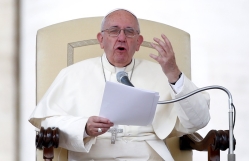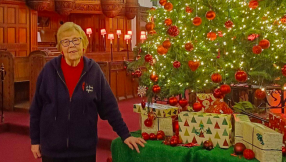Hundreds of thousands of Catholics and non-Catholics are lining up to celebrate the Pope's visit to America. It begins this afternoon in Washington and ends with an address to 1.5 million people at the World Meeting of Families in Philadelphia on Sunday. The visit is being treated in terms of "Pope mania" and an event of "biblical proportions".
The excitement is tangible. This most charismatic of Popes is 78 and has never set foot on American soil before. Judging by who he is meeting and where he is going, he has the chance to effect real change. Tomorrow he will meet President Barack Obama in the Oval Office and attend a party on the White House Lane with 15,000 guests including gay and transgender activists and the gay retired episcopal bishop Gene Robinson. On Thursday he will addresss US Congress before speaking at the United Nations in New York on Friday and visiting the 9/11 memorial at Ground Zero. As he always insists on foreign trips, he will also meet people on the edges, the homeless, the marginalised, the imprisoned.
His approval rating is high, with six in ten Americans on side, but it is lower than it was when he was first elected, when it was nearer to eight out of ten. It is still above that of his predecessor Benedict XVI and almost as high as that of John Paul II. It would be higher, but conservative Americans are unhappy with his view of money as the "devil's dung", his stance on the environment and the softer line he seems willing to take than his predecessors on issues such as homosexuality and marriage after divorce.
An analysis by Laurie Goodstein in the New York Times gives an insight into the challenges facing the Pope in the US, a visit that will lead directly into the Synod on the Family in Rome next month. Next year, he will issue a teaching document. The world will then have a clearer idea of how much of the change he appears to promise is real.
That the Church must change, if only for its own sake, is clear. The question remains, what form that change should take.
The Church in the US is itself being buffeted by immense change in the world around it, and it is struggling, writes Goodstein. Challenges include new immigrants, a shortage of priests and declining congregations. "The denomination is still the largest in the United States, but its power base is shifting."
Archbishop José Gómez of Los Angeles told her: "The ethnic face of the church is changing, and the centre of gravity and influence in the church is shifting from the East to the West, and from the North to the South. Pope Francis knows all of this. He knows the face of the church is changing, he knows the country's Hispanic Catholic heritage, and he knows how important Hispanics are for the future of the church."
In addition, sex abuse scandals have damaged its reputation internationally. The ban on women priests looks increasingly unjust from outside the Church, although an insistence on seeing it in terms of tradition only from within means this injustice has never been faced up to and is unlikely to be in the near future, even under this Pope. His recent move to speed up the annulment process will go some way to addessing the cruelty of the Church's ruling on divorced and remarried Catholics and the denial of access to Holy Communion, but the fact of this ruling still exists. Reform of the ban on artificial contraception is as remote as ever, even though many, if not most, Catholics simply ignore it.
The problems, added up, seem insurmountable.
Added to this is the fact of the internet and social media. Privacy and secrecy are compromised as never before, with both good and bad consequences. Bad things done by a minority of priests to children, anywhere in the world, can no longer be hidden as they once were. But obsessive focus on the negative can also be a blind to the massive amounts of positive works done in service to the common good by the majority of priests, the majority of people even.
If anyone can harness the incredible potential of his person and position to do good in the world and effect change, it is this Pope. But how, given all these challenges, can this even be possible?
At a briefing on the Synod on the Family, to which he is going with a team from England and Wales, I asked Archbishop of Westminster Vincent Nichols. Was it even possible in today's world, given the reality of modern communications and social media, to bring unity across cultures and nations to the teachings of the Church and thus to the common good?
For a Catholic, his response was surprisingly evangelical. The emphasis, he said, must be on the person of Jesus. "This is not a private relationship with Jesus, but a personal and therefore corporate relationship with Him. That is at the heart of this Pope's mission. It is all about restoring and renewing a personal relationship with Jesus."















